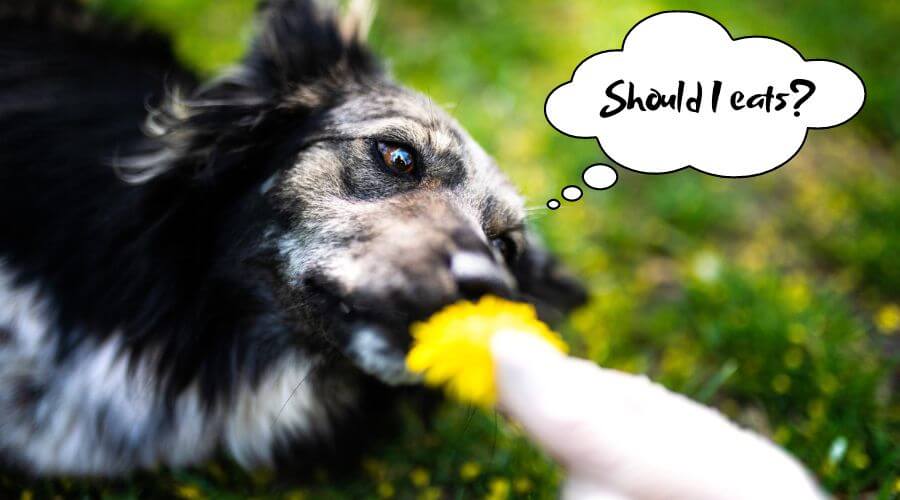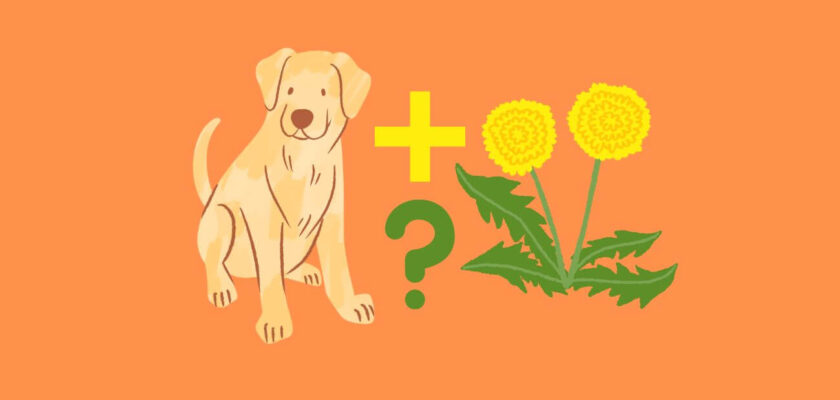Dogs and Dandelions
- Do you know what’s common between dandelions and sunflowers? No, it’s not their love for the sun; they’re actually distant relatives! 🌻
- Can dogs eat dandelions? The answer is a resounding yes, with a teeny tiny footnote of caution. Packed with fiber and vitamins A, C, and E, these feisty flowers can be a paw-fect addition to your dog’s diet. 🌻
- Beyond being a vitamin storehouse, dandelions are natural detox agents, taking care of your pup’s liver like a pro. Acting as diuretics, they’ll keep your dog peeing healthy, flushing out toxins and keeping their system squeaky clean! 🌻
- Just remember, while dandelions can be the life of the party, too much of anything can turn into a disaster. And as dog lovers, we definitely don’t want that! 🌻
Benefits of Dandelions for Dogs
Can dogs eat dandelions? Absolutely! Let’s wag our tails through the sunny benefits this humble weed can bring to your dog’s dish:
- Dandelions are a fiber-fantastic food that can give your dog a digestive system smoother than a well-groomed poodle. Snacking on these could keep those doggie bathroom woes like constipation and diarrhea at bay.
- These sunny surprises are packed with Vitamins A, C, and E, which are all essential for your pup’s health. While vitamin A acts like a shield for your dog’s precious peepers, vitamin C is like a cheerleader for their immune system.
- Beyond vitamins, dandelions are a cocktail of beneficial minerals. Potassium takes care of those muscles and organs, also playing a role in regulating blood pressure. Calcium ensures your pup’s bones and teeth stay strong and healthy. Manganese keeps the blood sugar levels in check, and iron pitches in for the production of red blood cells.
- If there was a detox superfood for dogs, dandelions would win, paws down! They’re brimming with luteolin, a wonder flavonoid that protects liver cells from damage like a seasoned superhero!
- Another notch on the dandelion’s belt: acting as a natural diuretic! This means they help get rid of unwanted toxins in your dog’s body by encouraging a healthy urine output.
- Last but not least, dandelions are also inflammation-busters, thanks to their antioxidant content. Who knew this common ‘weed’ could pack such a punch, right?

Editor’s Note 🌻
When taking my buddy out for a walk, I occasionally let him snack on a dandelion leaf or two. But, always mindful of the golden rule: too much of anything spoils the fun!
Cons of Dandelions for Dogs
Now, let’s flip the coin. Can dogs eat dandelions without any potential risks? As with all good things, dandelions can bring a bit of trouble if consumed in large quantities. Excessive potassium could get your dog’s heart racing in not-so-good ways, and the high levels of calcium oxalate might pose a risk for kidney stones.
Moreover, dandelions have a bitter secret, a compound called taraxacin, which could send your dog’s tummy on a roller coaster ride. If your pooch is an allergy-prone sniffer, especially to ragweed, they might also react to dandelions. Always remember to consult your vet if you notice any unusual symptoms!
Dandelion Greens Are Safe for Dogs to Eat
Now, if you’re wondering which part of the dandelion your furry friend can devour, it’s the green leaf! These leaves are bursting with vitamins and minerals, making them a superior choice over the pretty, yet less nutritious, flower.
Dandelion Root and Stem: No-Go Zones!
Dandelion root and stem are the parts where you need to draw the line. These parts of the plant can contain latex, which some dogs might be allergic to. Keep an eye on any signs of discomfort like vomiting, diarrhea, and difficulty breathing if your dog accidentally munches on these.
How to Feed Your Dog Dandelions?
If you’re stoked to introduce dandelion into your pup’s menu, remember you can opt for fresh or dried leaves. Fresh ones can be a bit messy (but hey, since when has dog parenting been clean?), while the dried ones come with the convenience of store packaging.
Remember, always pick dandelions from safe areas that haven’t been exposed to harmful pesticides or herbicides. You can chop the leaves and sprinkle them over your dog’s food, or use dried ones as a healthy treat. Brewing dandelion tea for your furball is also an option. If you want to get all fancy, you can even pop a dandelion pill into their food! Start with small portions and gradually increase the amount as your pup’s system adjusts.

Can Dogs Eat Dandelions? Final Word
So, can dogs eat dandelions? The answer is a big, slobbery yes! But remember, moderation is key! The leafy greens of the dandelion plant are packed with nutrients, perfect for your furry friend. However, stay away from the root and stem, which can be toxic to some dogs. Always consult your vet if you’re unsure, and remember to check for any signs of allergies. Thanks for sticking with us on this dandy adventure!
Frequently Asked Questions
Are Dandelions Toxic to Dogs? 🌻
The root and stem can be harmful to dogs. The flowers and leaves are safe, but should be offered in moderation.
Why Is My Dog Eating Dandelion Leaves? 🌻
Dandelion leaves can help with digestion, and your dog may be self-medicating an upset stomach.
Are Dandelion Flowers Edible for Dogs? 🌻
Yes, but they don’t offer as many nutrients as the leaves.
Which Part of the Dandelion Is Poisonous? 🌻
The root and stem can be harmful to dogs if consumed in large quantities.
How Much Dandelion Can a Dog Have? 🌻
It’s best to start with a small amount and gradually increase it as needed. Consult with your vet before introducing dandelions into your dog’s diet.
Similar Posts:
- Can Dogs Eat Radishes? The Pros and Cons of Feeding Your Pet This Vegetable
- Can Dogs Eat Cilantro? Coriander, Cilantro & Dogs
- Can Dogs Eat Eggplant?
- Can Dogs Eat Apples? Benefits and Dangers of Feeding Apples to Dogs
- Can Dogs Eat Cranberries? Are Dried Cranberries Safe for Dogs?
- Can Cats Eat Tomatoes? Is Tomato Sauce Safe for Cats?
- What Vegetables Can Dogs Eat? Our List of Best Vegetables Dogs Can Eat
- Can Dogs Eat Brussels Sprouts? Should It Be Raw or Cooked?

